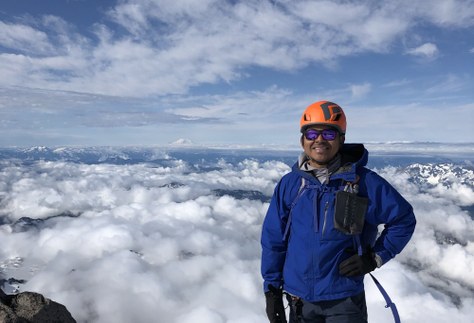For the December 1, 2019 edition of Mountaineer magazine, I had the pleasure of meeting and interviewing Luis Campos to share his story. I don’t do much writing for the magazine these days, and I felt extremely lucky to draw this story. Luis has an ease about him, a comfort in his own skin that surely he fought for, as this story will show. To see the original version, visit the Mountaineer magazine archives.
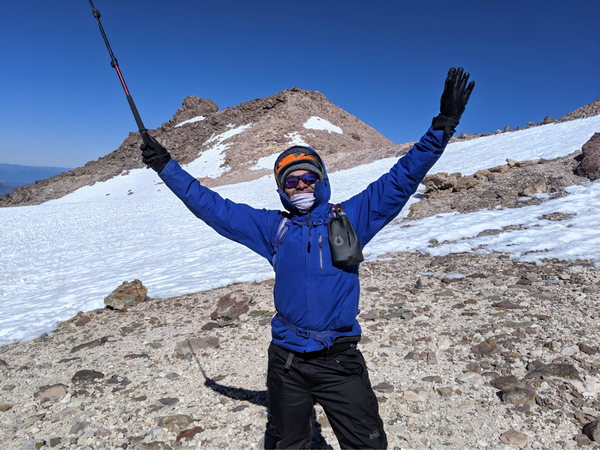
17 miles per hour. That’s the speed of the rope tow at Meany Lodge when it’s in third gear. Touted as the fastest, longest, legally operated tow west of the Mississippi, the Meany Tow whisks skiers 500ft up an east-facing glade deep in the heart of Stampede Pass. The angle is gradual at first, but then steepens midway, creating a small gap between the rope and the slope. Regulars will tell you they routinely see small children lift off the ground, carried for a dozen or so feet before touching back down on the high side. They love it.
The 17 mph rope tow isn’t the only remarkable thing about Meany Lodge. Like everything in The Mountaineers, Meany was created by, and continues to be nurtured and run by, volunteers. The fantastic food you eat, the cozy beds you sleep on, and the warmth you feel when you visit are all thanks to a cohort of hardworking, adventure-sharing volunteers. All are welcome here, whether you’re up for a 17 mph ride or not.
One of the volunteer gigs available at Meany Lodge is running the Meany Tow. With two different ropes (“Mach” and “Turtle”) and three gears to choose from, the tow operator needs to be on the lookout for all kinds of calamity. Downed riders and impromptu snowball fights mean you need to be ready for anything from your safe perch inside a plywood and Plexiglas box. One of the folks you might find running the show is Luis Campos, a relatively new Mountaineers member who has participated in a remarkable number of courses and programs in his short tenure. And, with a cup of hot cocoa in hand (extra marshmallows please!), he’s just the type of person you want at the helm.
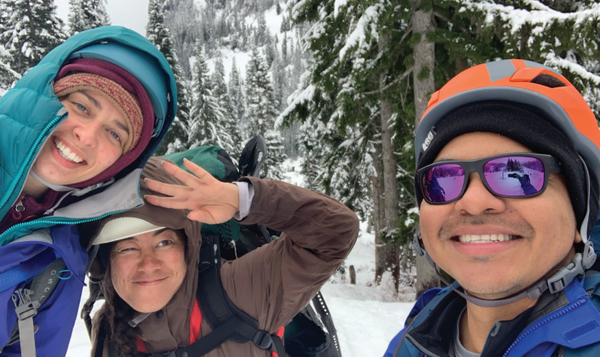
EL SALVADOR TO VIRGINIA
Like most people, Luis’s road to The Mountaineers is a winding one. He grew up in El Salvador, and then moved to Virginia with his dad, step-mom, and two younger siblings when he was 19. Luis didn’t speak a word of English. To learn, his family enrolled him in high school. He’s probably the only person you’ll ever meet to have graduated from high school twice.
“My first day, I will never forget that. I started in October because I needed all my shots, and that took a long time. So, on the first day I went to school, I had English, ESL 1. The teacher kept asking me what my name was and why I started a month late and all that. And I had no clue what she was saying!”
Learning English wasn’t the only adjustment. “The teacher couldn’t pronounce my name correctly. I’m Latino, and some of us have four names, and my middle name is Roberto. She couldn’t roll her R’s, and she was like Roberto, Ro-Bert-O,” he said, exaggerating the mispronunciation with a slight southern drawl. The other students stepped up to help him out, and Roberto asked them to tell the teacher to call him by his first name, Luis. “The first day of school, I not only had to learn English, but I had to go by a different name. I had to train my ears and my brain to respond to Luis.”
Thankfully for Luis, he’s not shy, and he jumped right into his strange new world. “I was like, whatever, people will understand me one way or another. I kept speaking Spanglish and then, little by little, I didn’t need someone to translate for me going into the clinic or going in the consulate and stuff like that.” After just seven months Luis mastered English, and he still reads and watches television in English only. Save for one book. “I do have my favorite book, One Hundred Years of Solitude, in Spanish because I really love that it’s more flavorful in Spanish than English.”
VIRGINIA TO SEATTLE
Having successfully graduated from high school (again), Luis felt aimless. “Nothing really happens in Virginia,” he said. “It’s really flat. I mean, it does have Shenandoah National Park, but I needed a change. I was kind of codependent and I wanted to become an adult and not rely on my family as much. With Latinos, there’s a sense that family is always there and sometimes not in a good way. It doesn’t matter how old you are, your parents will still go into your house and tell you what you’re doing wrong. And it’s like, uh, it’s my own life. I pay my bills!”
At the seven-year mark, Luis hatched a plan. “I told [my dad and my job] that I was taking a month off. I didn’t tell them I was moving. I was like, well if that doesn’t work out, I’ll come back and still work.” Luis conscripted his brother to help him smuggle a big suitcase out of the house a few days in advance, then on the day of the flight waltzed out with only a carry-on.
He crashed with a friend of a friend, securing a job on his second day in Seattle and moving into his own studio eight days later. “I went to my new home and I thought, ‘welcome to freedom!’” But sitting in an empty studio, with only his luggage and clothes, didn’t feel great at first. “I was like, ‘this is so depressing and lonely’. I was so used to having friends, a lot of friends, and I used to spend most of my time with my friends. But I wanted to grow up. I wanted to stay away from my family. And I thought, ‘This is it. This is your new beginning!’ So, I started working a second job and little by little started buying furniture and jumping into the city. It was all a work in progress.” At the 30-day mark, Luis called his family and told them he wasn’t coming back.
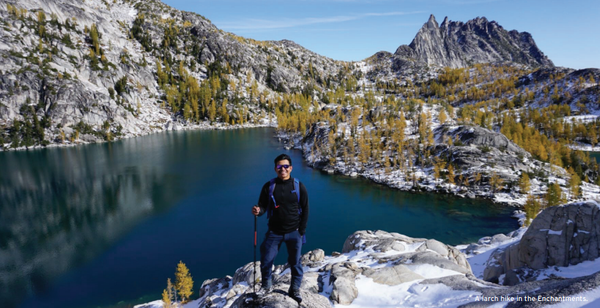
DISCOVERING THE REAL LUIS
Luis left Virginia to forge his own path in more ways than one. “With the Latino community, they’re family oriented, but they also have a different mentality. My family still has the Salvadorian mentality. They haven’t changed to be more open minded, and I’m gay. Back home it was really hard for me to be myself.”
Tired of constantly fighting a battle within, Luis embraced the part of himself he’d been suppressing his entire life. “I moved for a reason: to be happy, to be accepted, to have friends, and to be who I’m supposed to be. I took me a long time to finally accept myself and come to terms with the fact that I’m gay and I love myself and I shouldn’t feel bad about it.”
He made lots of friends quickly, mostly over drinks, spending many nights out on the town. Then one day, after one of many long nights, it got to be too much. He gave up drinking, and many of the friends he had made doing it, and decided he wanted to spend more time outside. Being outdoors was a way to feel connected to his mom, who he hasn’t seen since leaving El Salvador.
“I get the outdoorsy part from my mom. She moved to Ecuador [after we moved away] and she’s really adventurous. She’s been to Machu Picchu and so many other mountains. Since we were kids she would take us to the mountains to pick apples or to go to the beach. We were going somewhere all the time. Then, when I became an adult, I forgot that. I got caught up with the whole social life. And when I quit drinking I remembered, ‘Oh, the mountains are there. And you like them, and this is the best place to be.’”
Luis began growing his gear collection and started venturing out on his own. He joined a few outdoor-oriented Facebook groups, and signed up for a single-day thru hike of the Enchantments. Twelve people RSVP’d, but only three showed up. “The people that went, let’s just say that they were not prepared. They didn’t do the research. I had to give away my jacket, water, gloves, food. It was horrible. We went to dinner after and one of the other guys told me about The Mountaineers. When I got home I spent like three hours reading everything online before I decided to join.
“I saw a work party at Meany Lodge, and I was like ‘well, why not give it a try?’ Plus I was still like getting used to not drinking and having less friends and I needed to keep myself away and busy for my own sanity. And so I decided to go.
“The first weekend I didn’t even know what was I getting myself into. But everyone at Meany was really welcoming. They showed me around, they shared stories, and they had food and coffee and everything was ready.” Meany had posted three work parties that year, and Luis signed up for all of them. “I felt really welcomed and I really liked the people. It was like a sense of a family. And after having a bunch of friends and partying all the time, going down to just a few friends can be kinda overwhelming. Going to Meany was what I needed. I needed a sense of belonging.”
On the last day, the other volunteers asked if he would be interested in volunteering for the winter season. Luis was surprised to even be asked. “I was like, me? Why? Really? I kept asking them why, but thought that I was really interested. It felt really awesome.”
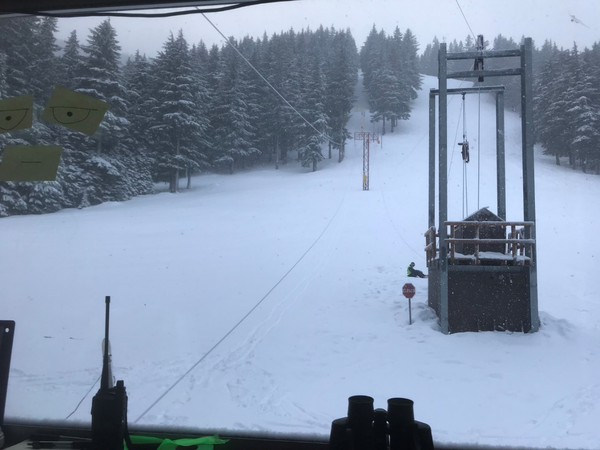
MR. CAMPOS, ROPE TOW OPERATOR
Luis embraced his new family with open arms and boot-laden feet. The first year he signed right up for snowboarding lessons. He’s only snowboarded once before, but the rope tow provided him with his first “uphill” experience. “The first time I rode the tow I was strapped to a snowboard. My chicken legs were shaking!” Despite the terror, he was hooked.
He tried to bring his friends along for the fun too, but ran into resistance. “I realized through this whole transition from me not drinking to becoming more outdoorsy that change comes from within. You cannot force someone to change. I try with my friends, but it hasn’t really worked. You have to have that willingness to move forward and to venture into the unknown. You have to have that sense of adventure.”
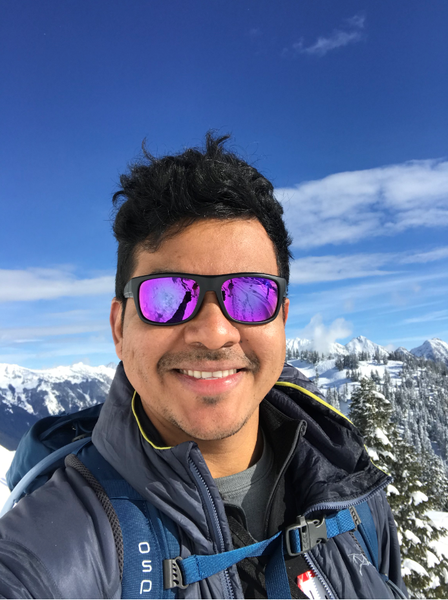
Last year he took Basic Climbing with the Olympia branch. Despite living in Seattle, he sought out the course in Olympia because he was attracted to the smaller community. He’s now in the Olympia Intermediate Climbing course, has graduated from Wilderness Navigation (with Tacoma) and Wilderness First Aid (with Foothills), and earned his AIARE I certification.
Luis spends most winter weekends at Meany Lodge. “It’s a really accepting place and you can be yourself. It’s perfect because you get away from the whole busy life and you’re just an hour away. There’s no cell phone coverage. It’s just a lot of books, a lot of games, and you socialize with people with the same interests – the same love of outdoors. It’s a big family pretty much.” A big family built over cups of cocoa, snowball fights, and a 17 mph rope tow.

